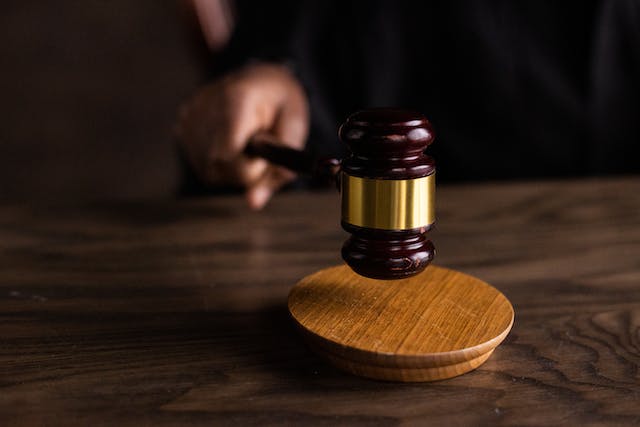
Why do we say, “pass the bar”? The bar was a physical bar that separated a courtroom between the judges, barristers, and participants, from the spectators and average people.
In all English countries, and in some other countries, to become a member of the law profession a person needs to pass the bar exam before they can be called to the bar. Once they have passed the bar exam, they can become a member of the bar association and they can be a barrister (or an attorney in America). If they do something wrong, they can lose their license to practice law and they can be disbarred. So, why do we use the word “bar” so much to refer to the law?
The system of courts has been around for a long time. In England, up until the 12th century, a criminal case was presided over by a lord or one of his stewards. Usually, the case would come down to “trial by ordeal”, where the plaintive had to do things like grab a stone out of a cauldron of boiling water. If their burns started to heal in three days, they had God on their side and they were innocent. That type of law had several issues and in the 12th century it was outlawed. At the same time, judges were introduced as well. The court system began to evolve from there. Judges became professionals, rather than members of the royal court acting as judges. The rules that governed them and the courts were slowly hammered out and the courts would have been somewhat recognizable to us today.
In the 14th century, courts were an unruly place. To keep the regular people away from the judges and the court proceedings, a physical bar was installed across the center of courts. On the one side were the officers of the court. These were the barristers, the solicitors, the judges, the magistrates, and the bailiffs. The prisoners, the people being tried, and the witnesses would be allowed on the same side. On the other side of the bar were the regular members of the public who were usually there to watch or to support someone. So, “to pass the bar” literally meant to go from one side of the court to the other. To go from the side of the court for regular people to the side of the court for the people who worked in the law. There is still a bar or a partition in most courts, that separates the spectators from the people who work in the court.
Over time the word bar came to mean the law itself. Hence the bar exam, passing the bar, being called to the bar, being disbarred, and barrister. A barrister is a lawyer in the UK and many other countries that share a legal system with the UK. America used to use barristers until the War of Independence and they changed their system. A barrister is a lawyer who is allowed to plead a case in a court of law. In America, this is simply an attorney. The word attorney comes from French and it meant “one appointed by another to act in his place”.
Both barristers and judges in the UK wear white wigs. This appears to have started in 1665, when Charles II was on the throne. He was a very fashionable monarch and wigs became a popular trend during his reign. Judges and barristers started to wear white wigs because of the fashion but, over time, the wigs came to be a symbol of their authority. Now, to appear in court without wigs is seen as very unprofessional. When the judge and the barristers have a conference in the judge’s chambers and they want it to be informal, they take off their wigs. If it is formal, they keep their wigs on. The USA stopped this practice after the War of Independence. This was partly because they wanted to break away from British tradition, but also because the British had imposed a tax on hair powder that made wigs too expensive.
As an interesting aside, the word “bar” as in a drinking establishment also comes from a metal dividing bar. Many bars still have a metal bar that runs along the top of the counter. This was used to separate the barkeep serving the drinks from the drinkers on the other side. In 1592, the word “bar” is first used to mean a drinking establishment. And the word “barred”, as in “You’re barred! Get out of here!” comes from an iron bar as well. In this case, the bar was used to lock the door behind the person so that they couldn’t get in again. And this is what I learned today.
Photo by KATRIN BOLOVTSOVA: https://www.pexels.com/photo/brown-wooden-gavel-on-brown-wooden-table-6077326/
Sources
https://en.wikipedia.org/wiki/Bar_(law)
https://www.theinternationallawyer.org/why-is-it-called-the-bar-exam-this-may-surprise-you/
https://www.etymonline.com/word/barrister
https://www.etymonline.com/word/barring
https://www.law.ac.uk/resources/blog/why-do-barristers-wear-wigs/
